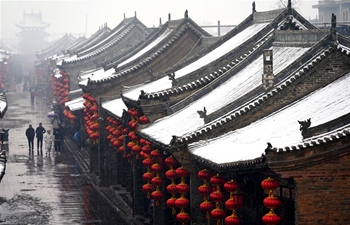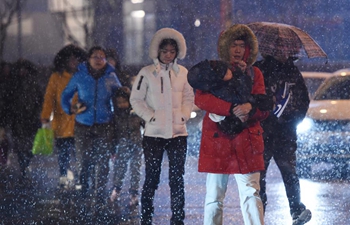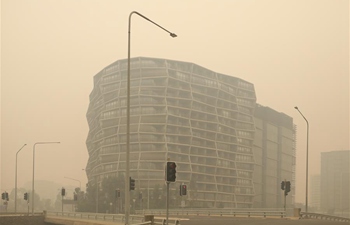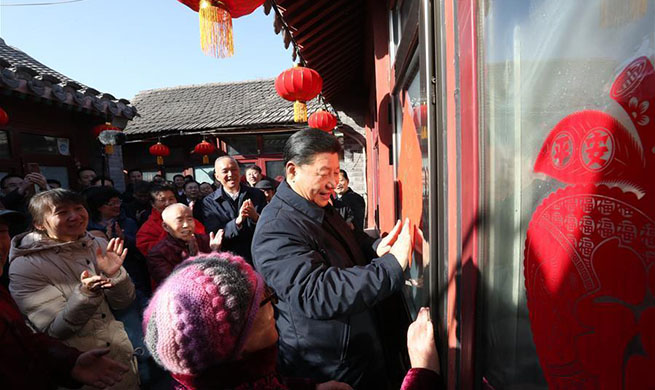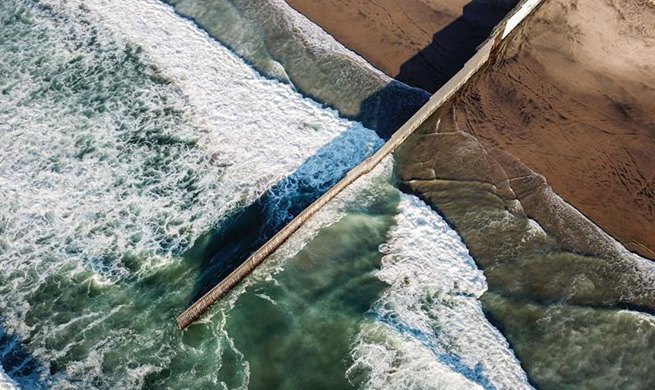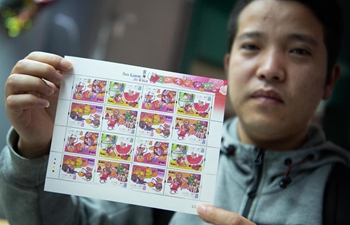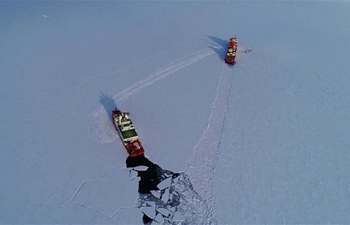TOKYO, Jan. 6 (Xinhua) -- Japanese Prime Minister Shinzo Abe on Monday encouraged a deescalation of tensions in the Middle East, calling on all parties involved to step up diplomatic efforts.
Expressing his "deep concern" over a recent spike in tensions after the United States conducted an airstrike on Baghdad killing a top Iranian general last week, with Iran vowing retributions, Abe said parties involved should "exhaust diplomatic efforts" to ease tensions.
"With heightened tensions in the Middle East, I'm deeply concerned about the current situation. A further escalation of the situation should be avoided and I ask all parties involved to exhaust diplomatic efforts to ease tensions," Abe said during his first press conference of the year.
The deadlock between Iran and the United States has intensified since a 2015 nuclear accord was inked between Iran and some major world powers.
Under U.S. President Donald Trump, however, the United States pulled out of the deal and slapped crippling sanctions on Iran.
Tehran has responded by saying it will no longer stick to uranium enrichment limitations under the accord, doubling-down on its stance as recently as Sunday, local media here said.
Abe said that Japan will continue to try and mediate between its U.S. ally and Iran, the latter of which Japan maintains friendly ties with, as part of its own diplomatic efforts.
The Japanese leader mentioned no change in the Cabinet's decision made last month to dispatch the nation's Maritime Self-Defense Force (MSDF) personnel to the Middle East, despite the rising tensions and public opposition, as well as concern over post-war military constraints restricting the nation's military activities constitutionally.
The planned deployment is to purportedly conduct "information-gathering" operations and others related to enhancing the safety of commercial shipping in the region.
Two P-3C patrol planes and a helicopter-carrying destroyer will be sent to the Middle East, along with around 260 MSDF personnel, to engage in a one-year survey and research mission. Japan has said that it needs to increase its surveillance activities for the safety of ships operating in the region.
The peace and stability of the Middle East are vitally important for the peace and prosperity of the international community, including Japan. It is necessary to boost intelligence activities for the safety of Japan-related ships in the region, Chief Cabinet Secretary Yoshihide Suga, Japan's top government spokesperson, previously said of the matter.
The move is also a thorny one owing to the nation's war-renouncing constitution, which heavily restricts the activities of the SDF and specifically prohibits Japan from engaging in acts of war or maintaining armed forces with war potential.
Japan has decided to conduct its information-gathering and security operations independent of a U.S.-led coalition to ensure maritime security in the Strait of Hormuz, saying that the MSDF will stay away from the strait near Iran in a bid to maintain its friendly ties with Tehran.
Among other incidents, in June, a Japanese-owned tanker was attacked near the Strait of Hormuz, a vital global shipping artery.
Under the current plan, the MSDF could be deployed to the potentially turbulent region for around one year, with the duration being extended if approved by the Cabinet.
The strait is a key gateway for oil from the Middle East to reach resource-poor Japan and the nation relies heavily on the Middle East for most of its oil.
The majority of the Japanese public, however, are opposed to the dispatch according to a recent media poll, and the end of last year saw demonstrations against the deployment held in front of the prime minister's office, comprising hundreds of concerned citizens as well as opposition lawmakers.
Abe in his address on Monday also touched on his legacy-led goal of amending Japan's pacifist Constitution, calling for more cross party debate on the contentious proposal.
He also remarked on the possible future course of the 11-member Trans-Pacific Partnership free trade pact.
Amid the nation's demographic crisis, the Japanese premiere, during his New Year press conference after visiting Ise Shrine in Mie Prefecture, central Japan, also vowed to reform the country's social security system, as the country grapples to deal with its rapidly aging and shrinking population.


